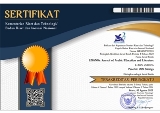The Effectiveness of Quizlet.com in Arabic Vocabulary Learning; Students’ Perception and Acceptance of Technology
Abstract
Keywords
Full Text:
PDFReferences
Agustin, R. W., & Ayu, M. (2021). The Impact of Using Instagram for Increasing Vocabulary and Listening Skill. Journal of English Language Teaching and Learning (JELTL), 2(1), 1–7.
Ajisoko, P. (2020). The use of duolingo apps to improve English vocabulary learning. International Journal of Emerging Technologies in Learning, 15(7), 149–155. https://doi.org/10.3991/IJET.V15I07.13229
Alabsi, T. A. (2016). The Effectiveness of Role Play Strategy in Teaching Vocabulary. Theory and Practice in Language Studies, 6(2), 227. https://doi.org/10.17507/tpls.0602.02
Alnuhayt, S. S. (2018). Investigating the Use of the Flipped Classroom Method in an EFL Vocabulary Course. Journal of Language Teaching and Research, 9(2), 236. https://doi.org/10.17507/jltr.0902.03
Andujar, A., Salaberri-Ramiro, M. S., & Martínez, M. S. C. (2020). Integrating flipped foreign language learning through mobile devices: Technology acceptance and flipped learning experience. Sustainability (Switzerland), 12(3). https://doi.org/10.3390/su12031110
Anjaniputra, A. G., & Salsabila, V. A. (2018). THE MERITS OF QUIZLET FOR VOCABULARY LEARNING AT TERTIARY LEVEL. Indonesian EFL Journal, 4(2), 1. https://doi.org/10.25134/ieflj.v4i2.1370
Annisah, R. (2019). the Implementation of Silent Way Method With Flashcard to Improve Students Vocabulary In Junior High School. Universitas Muhammadiyah Sumatera Utara.
Arafah, B., & Ahmad, D. (2020). Word Wall Media: An Effective Teaching Technique to Enrich Students’ Vocabulary in Secondary Level of Education. International Journal of Advanced Science and Technology, 29(5), 13228–13242.
Barr, B. W. B. (2016). Checking the Effectiveness of Quizlet as a Tool for Vocabulary Learning.
Chaikovska, O., & Zbaravska, L. (2020). THE EFFICIENCY OF QUIZLET-BASED EFL VOCABULARY LEARNING IN PREPARING UNDERGRADUATES FOR STATE ENGLISH EXAM. Advanced Education, 7(14), 84–90. https://doi.org/10.20535/2410-8286.197808
Chan Díaz, J. L. (2016). Word cards: an effective or an obsolete strategy to learn the spelling, meaning and grammatical function of new vocabulary. Pensamiento Actual, 16(26), 59. https://doi.org/10.15517/pa.v16i26.25190
Fazriani, N., Setianingsih, T., & Firman, E. (2020). The Effectiveness Of Word Card As Media To Improve Students’ English Vocabulary. JISIP (Jurnal Ilmu Sosial Dan Pendidikan), 4(3). https://doi.org/10.36312/jisip.v4i3.1135
Hamad, M. M. (2017). Using WhatsApp to Enhance Students’ Learning of English Language “Experience to Share.” Higher Education Studies, 7(4), 74. https://doi.org/10.5539/hes.v7n4p74
Hikmah, S. D. (2021). The Use of Animation Video for Vocabulary Mastery. English Journal For Teaching and Learning, 09(02), 151–162.
Ismailova, K. E., Gleason, K., Provotorova, E. A., & Matukhin, P. G. (2017). The Use of Online Quizlet.com Resource Tools to Support Native English Speaking Students of Engineering and Medical Departments in Accelerated RFL Teaching and Learning. Accelerated RFL Teaching and Learning. Mechanics, Materials Science & Engineering Journal, 7, 10. https://doi.org/10.2412/mmse.05.805.901ï
Khoshsima, H. (2016). Effectiveness of concept mapping strategy on EFL learners ’ Attitude and gender difference outcomes in vocabulary .... … Journal of Humanities and …, 3(September), 640–656.
Komalasari, N., & Zuhriyah, M. (2021). Using Quizizz Game to Improve Student’s Vocabulary Mastery In Grade VIII C AT MTs Ibnu Rosyad. TEFLICS Journal, 1(2), 34–48.
Kumara, R. D. C. (2016). the Use of Anagrams To Improve the Students’ Vocabulary Learning Strategy in Xi Ipa 1 Class,Sma Pangudi Luhur Sedayu a. Sanata Dharma University Yogyakarta, 136, 1–136.
Leong, L., & Ahmadi, S. M. (2017). An Analysis of Factors Influencing Learners’ English Speaking Skill. International Journal of Research in English Education, 2(1), 34–41.
Mansur, M., & Fadhilawati, D. (2019). Applying Kahoot to Improve the Senior High School Students’ Vocabulary Achievement. VELES Voices of English Language Education Society, 3(2), 164. https://doi.org/10.29408/veles.v3i2.1591
Maskor, Z. M., Baharudin, H., Lubis, M. A., & Yusuf, N. K. (2016). Teaching and Learning Arabic Vocabulary: From a Teacher’s Experiences. Creative Education, 07(03), 482–490. https://doi.org/10.4236/ce.2016.73049
Muflihah, T. (2017). Using Song to Improve Students’ Vocabulary Mastery. Prosiding Seminar Nasional Pendidikan.
Neno, H., & Erfiani, Y. P. F. (2018). The Effect of Jigsaw Method to Improve EFL Students’ Vocabulary Ability. Metathesis: Journal of English Language, Literature, and Teaching, 2(2), 171. https://doi.org/10.31002/metathesis.v2i2.695
Ni’mah, K. (2017). Korelasi Penggunaan Kosa Kata Bahasa Arab dengan Kemampuan Berpidato Bahasa Arab Mahasiswa PBA UNSIDA Lamongan. DAR EL-ILMI : Jurnal Studi Keagamaan, Pendidikan Dan Humaniora, 4(1), 274–282.
Novo-Corti, I., Varela-Candamio, L., & Ramil-Díaz, M. (2013). E-learning and face to face mixed methodology: Evaluating effectiveness of e-learning and perceived satisfaction for a microeconomic course using the Moodle platform. Computers in Human Behavior, 29(2), 410–415. https://doi.org/10.1016/j.chb.2012.06.006
Pham, A. T. (2022). University Students’ Perceptions on the Use of Quizlet in Learning Vocabulary. 17(7).
Purba, N., Handini, M. C., & Yetti, E. (2018). Development of Media Vocabulary Cards to Improve the Speech Competence of Children with Intellectual Disabilities. International Journal of Multidisciplinary and Current Research, 6(04). https://doi.org/10.14741/ijmcr/v.6.4.6
Rahimi, N. M., Azhan, N., Normeza, W., & Baharudin, H. (2015). Students’ feedback towards using facebook in learning Arabic language. Asian Social Science, 11(28), 170–174. https://doi.org/10.5539/ass.v11n28p170
Rizky Setiawan, M., & Wiedarti, P. (2020). The effectiveness of quizlet application towards students’ motivation in learning vocabulary. Studies in English Language and Education, 7(1), 83–95. https://doi.org/10.24815/siele.v7i1.15359
Samsun Baharun, M. N. A., Mohamad, N., Wan Abd Rahman, A., & Ramli, Z. (2021). Investigating Mastery Level of Arabic Academic Vocabulary (AAV): A Study Among Malaysian Public Universities. International Journal of Academic Research in Progressive Education and Development, 10(1), 268–285. https://doi.org/10.6007/ijarped/v10-i1/8547
Sanosi, A. B. (2018). The Effect of Quizlet on Vocabulary Acquisition. In Asian Journal of Education and e-Learning. https://quizlet.com
Sinaga, G. A., Safitri, A. N., & Efransyah, M. (2018). Teaching Vocabulary Using Direct Method At Seventh Grade of Junior High School. PROJECT (Professional Journal of English Education), 1(5), 651. https://doi.org/10.22460/project.v1i5.p651-656
Subiyati, M. (1985). Kemiskinankosa kata: penyebabkelemahan membaca. Cakrawala Pendidikan, 4(1), 16–21.
DOI: https://doi.org/10.18326/lisania.v7i1.1-13
Refbacks
- There are currently no refbacks.
Copyright (c) 2023 Muhammad Nur Kholis, Muhammad Fahrun Nadhif

This work is licensed under a Creative Commons Attribution-ShareAlike 4.0 International License.
View My Stats







